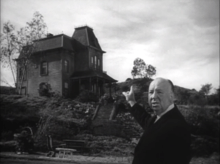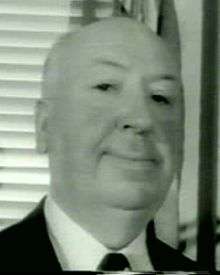
Television has done much for psychiatry by spreading information about it, as well as contributing to the need for it.
Sir Alfred Joseph Hitchcock, KBE (13 August 1899 – 29 April 1980) was a English film director and producer, closely associated with the suspense thriller genre. He is a well-known man and an award-winning director. He directed and produced three of the American Film Institute Top 100 Films, Vertigo (1958), Psycho (1960), and North by Northwest (1959), two psychological thrillers and a suspense film. Additionally, Vertigo was rated as the best film of all time in the 2012 British Film Institute Sight and Sound poll of the greatest films of all time.
Quotes

If I made Cinderella, the audience would immediately be looking for a body in the coach.

Dialogue should simply be a sound among other sounds, just something that comes out of the mouths of people whose eyes tell the story in visual terms.
- Hitchcock: You know that I think all actors are cattle?
George Raft: Yes, I know—but I'm no actor.- On the set of The House Across the Bay; as quoted in "The New Yorker" by Leonard Lyons, in The Washington Post (26 July 1940).
- [T]he director passed off the phrase as one of his "Machiavellian quips," not to be taken seriously. "Let us say, rather, that actors are a necessary evil," he cautioned, with a straight face. "As a matter of fact, I couldn't work if I weren't on friendly terms with them; I'll bend over backward every time. Besides, I get into each picture I make, if only for a couple of seconds—so I'm probably a frustrated actor at heart myself."
- Regarding his oft-cited quote stating that actors are cattle; as paraphrased and quoted in "Town Called Hollywood: Director Pleads Off Poundage" by Philip K. Scheuer, in The Los Angeles Times (30 May 1943).
- It still goes. But Pat is the nicest cattle I've ever seen.
- Reaffirming the "actors are cattle" quote while in Boston to see his daughter perform onstage; as quoted in "The Lyons Den" by Leonard Lyons, in The Pittsburgh Post-Gazette (20 October 1944).
- The lower lip definitely states that all actors are cattle—including the authorǃ
- Handwritten note accompanying Hitchcock's sketched self-portrait; as seen in—and addressed to the author of—"Melodrama Maestro" by Hume Cronyn, in McClean's (1 November 1944).
- Actors are cattle. I've always said actors are cattle. In fact, Carole Lombard once built a corral on set and put three live calves into it, in recognition of my feelings. I tell them that, and treat them as such, and we get along fineǃ
- As quoted in "New York Close-Up" by Tex McCrary and Jinx Falkenburg, in New York Herald Tribune (27 February 1950).
- Deep inside, I am a shy man. And in the presence of colorful characters, I am a clam. I never try to out-eccentric the eccentricsǃ
- As quoted in "New York Close-Up".
- I am a typed director. If I made Cinderella, the audience would immediately be looking for a body in the coach.
- Newsweek (11 June 1956).
- Drama is life with the dull bits cut out.
- Picture Parade, BBC (5 July 1960)
- The Birds could be the most terrifying motion picture I have ever made.
- Movie trailer for the 1960s film The Birds.
- I’m frightened of eggs, worse than frightened, they revolt me. That white round thing without any holes … have you ever seen anything more revolting than an egg yolk breaking and spilling its yellow liquid? Blood is jolly, red. But egg yolk is yellow, revolting. I’ve never tasted it.
- News summaries (31 December 1963).
- A clear horizon — nothing to worry about on your plate, only things that are creative and not destructive and that's within yourself. Within me I can't bear quarreling, I can't bear feelings between people. I think hatred is wasted energy and it's all non-productive. I'm very sensitive. A sharp word, said by a person who has a temper, if they're close to me, hurts me for days. I know we're only human, we do go in for these various emotions, call them negative emotions but when all these are removed and you can look forward, and the road is clear ahead, and now you're going to create something. I think that's as happy as I would ever want to be.
- Hitchcock's Definition of Happiness (YouTube video), excerpt from CBC's interview 'A Talk with Alfred Hitchcock' (1964). Quoted in "Hitchcock's Secret to Happiness" by Maria Popova, The Atlantic (20 March 2012).
- We do not recommend suicide as a way of life.
- Alfred Hitchcock Presents. 1965.
- Television is like the invention of indoor plumbing. It didn't change people’s habits. It just kept them inside the house.
- NY Journal-American (25 August 1965).
- One of television's great contributions is that it brought murder back into the home, where it belongs.
- National Observer (15 August 1966).
- Seeing a murder on television can … help work off one’s antagonisms. And if you haven’t any antagonisms, the commercials will give you some.
- National Observer (15 August 1966).
- Dialogue should simply be a sound among other sounds, just something that comes out of the mouths of people whose eyes tell the story in visual terms.
- As quoted in Hitchcock (1967) by François Truffaut.
- Puns are the highest form of literature.
- Dick Cavett Show (8 June 1972).
- Give them pleasure – the same pleasure they have when they wake up from a nightmare.
- On audiences, Asbury Park NJ Press (13 August 1974).
- Self-plagiarism is style.
- Defending his repetition of filming techniques, in The Observer [London], (8 Aug. 1976).
- Blondes make the best victims. They're like virgin snow that shows up the bloody footprints.
- Interview on CBS TV (20 February 1977).
- [This award is] meaningful because it comes from my fellow dealers in celluloid.
- On receiving American Film Institute's 1979 Lifetime Achievement Award, recalled on his death (29 Apr. 1980).
- I’m not against the police; I'm just afraid of them.
- As quoted in Hitchcock (revised edition 1985) by François Truffaut, p. 109.
- In the documentary the basic material has been created by God, whereas in the fiction film the director is a God; he must create life.
- As quoted in Hitchcock (revised edition 1984) by François Truffaut with the collaboration of Helen G. Scott, p. 102.
- The silent pictures were the purest form of cinema.
- As quoted in Hitchcock (1967) by François Truffaut
- There is no terror in the bang, only in the anticipation of it.
- Attributed to Hitchcock in Halliwell's Filmgoer's Companion (1984).
Quotes about Hitchcock
- Hitch is a gentleman farmer who raises goose flesh.
- Ingrid Bergman, as quoted in TIME magazine (1979).
- I'd like to know more about his relationships with women. No, on second thought, I wouldn't.
- Here is someone … who has an enormous, inordinate, neurotic fear of disorder. And that's from which he makes his art. He always has his people in a moment of disorder. They think they're in control, they think they have power, they think they have order, and then he just slips the rug out from under them to see what they're going to do.
- Drew Casper, as quoted in "Master of Suspense" on NewsHour (13 August 1999).
- Like Freud, Hitchcock diagnosed the discontents that chafe and rankle beneath the decorum of civilization. Like Picasso or Dali, he registered the phenomenological threat of an abruptly modernised world.
- The man with the navy-blue voice.
- Barbara Harris, as quoted in The Observer [London] (6 August 1976).
- If Mr. Hitchcock would rid himself of the delusion that it is enough for an artist to give perfect expression of any subject—the feelings of a cat sitting on a garbage can, the smell of oper-ripe bananas in a broken basket on a dusty street—he would become a film producer of considerable merit in the world. He has originality. He has a fine economy of detail. He has made himself independent of words with a strongly developed pictorial sense. Some day he may surprise us all, and himself among the number, by making a picture that is as good in its conception as in its execution. And when Hitchcock sets to work on real film material, real artist's material, there will not be more than half a dozen producers in the world who will be able to beat him. There are none in England now.
- C. A. L., "The Week on the Screen: Britain's Baby", The Manchester Guardian (11 June 1927)
- Hitchcock had an artificial story and an artificial society to deal with here, but his treatment of them is not that of a director who matches artificiality of substance with artificiality of form, but of a man who has in himself so little reaction to flesh-and-blood truth that he is almost incapable of knowing the living from the dead. Hitchcock's blindness to the things that people do in expression of their real emotions is not a mannerism but a fact. In his work he thinks, and cannot feel. No director in England, and very few in America, can tell a screen story as cleverly as he—can narrate so subtly and simply to the eye, without a word written, using all the tricks of the camera and all the loquacity of silent things to carry his audience from point to point in perfect understanding and ease. But he will have to learn to know men as well as he knows the camera or, not knowing men, to turn his talents from the intimate to the impersonal kinema before he can become one of the great directors of the screen.
- C. A. L., "The Week on the Screen", The Manchester Guardian (3 September 1927)
- I suppose what surprised me most about Hitchcock was how little he directed us. I had done a number of films for Carol Reed and he seemed quite meticulous in contrast. Hitchcock, however, didn't seem to direct us at all. He was a dozing, nodding Buddha with an enigmatic smile on his face.
- Margaret Lockwood, as quoted in The Life of Alfred Hitchcock: The Dark Side of Genius (1983) by Donald Spoto, p. 174.
- Hitchcock finds women captivating but dangerous. She allures by nature but she is chief artificer in civilisation, a magic fabricator of persona whose very smile is an arc of deception.
- Camille Paglia, The Birds, p. 7
See also
- Category:Alfred Hitchcock films
External links
This article is issued from
Wikiquote.
The text is licensed under Creative
Commons - Attribution - Sharealike.
Additional terms may apply for the media files.